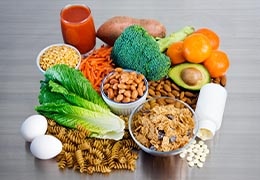Your toddler needs to consume all essential nutrients in the right amounts, so that he or she can grow steadily and healthily. And to ensure that, providing foods from all major food groups, is essential. Plus, as a parent, you need to understand how each nutrient can affect your child’s physical and mental development or the functioning of his or her vital organs. Now, since toddlers are often fussy eaters, they might miss out on important nutrients, which might lead to health problems as time goes by. So, to put your worries to rest, this article covers common nutritional deficiencies and ways in which you can fulfil them.
Why are nutrients important in your child’s diet?
Balanced nutrient intake is essential to boost your child’s cognitive health and prevent the onset of chronic diseases in later years. The most common nutrient deficiencies in children that are seen in their growing years are iron and vitamin D deficiency. Other deficiencies that develop if their nutrient requirement is not met are iodine, calcium, vitamin A and vitamin C deficiencies. Prolonged deficiencies can stunt your child’s growth and affect his or her overall development.
Macronutrients and micronutrients
Macronutrients refer to carbohydrates, proteins and fats. Carbohydrates are mainly obtained from whole-grain cereals, whole-wheat chapatis, rice, whole-grain bread, whole-wheat pasta, etc. Milk and milk products, pulses and legumes, chicken, eggs, and fish are major sources of protein. Healthy fats from nuts, seeds, peanut butter, and ghee are essential too. Colourful fruits and vegetables are rich sources of vitamins and minerals. While proteins, fats and carbs are easy to incorporate in your toddler’s meals, parents tend to miss out on certain micronutrients.
Common nutrient deficiencies
Micronutrient deficiencies in children are a major concern in developing countries like India, often due to a lack of awareness as well as fussy eating behaviour. Some deficiencies are mentioned below:
- Iron: Irritability, difficulty in breathing, craving unusual foods, low appetite, exhaustion, sore tongue, headaches, and dizziness are all symptoms of iron deficiency in your child. As it progresses, the whites of your child’s eyes might become pale or tinged with blue. Brittle nails and pale skin colour are other signs that might appear. Consumption of iron-rich food sources like chicken, fish, other meats, dal, rajma, channa, soybeans, apricots, eggs, raisins, prunes, spinach, mustard leaves, turnip greens, methi, and bathua can resolve this deficiency.
- Calcium and Vitamin D: Frequent pain and weakness in your child’s bones and muscles might indicate calcium and vitamin D deficiency. Consuming milk and milk products like paneer, curd, and cheese, leafy green vegetables like spinach, methi and mustard leaves, ragi, sesame seeds, fresh and dried fish, pulses, nuts and oil seeds can prevent calcium deficiencies. Vitamin D sources are mainly eggs and oily fish like rawas, hilsa, and ahi.
- Vitamin C: Vitamin C deficiency causes irritability, loss of appetite, and swollen, bleeding gums. Citrus fruits like fresh amla, orange, lemon, guava and banana can help avoid vitamin C deficiency.
- Vitamin A: Dry skin and lips, thickened tongue, and frequent urine infection usually indicate vitamin A deficiency. Green leafy vegetables like methi, spinach, bathua and mustard leaves, as well as carrots, tomatoes, sweet potatoes, papaya and mangoes have vitamin A in abundance.
- Iodine: The symptoms of iodine deficiency include exhaustion, muscle weakness, cold sensation on warm days, and unexplained weight gain. To avoid iodine deficiency, your child should have milk and milk products like curd, paneer, cheese and skimmed milk products, pulses like arhar, lentils, urad channa dal, and moong, nuts like almonds and walnuts, and oil seeds like flaxseeds and melon seeds.
- Zinc: Children with zinc deficiency show poor growth and suffer from frequent infections. Regular consumption of beans, nuts like almonds, walnuts and pistachios, seafood like fish, prawns and crabs, and whole grains like wheat and brown rice, can prevent zinc deficiency in kids.
All in all, consumption of a balanced diet that includes all the macro and micronutrients in the required amounts can help reduce the risk of nutrient deficiency in children.
To learn more about growth and possibilities for your child visit www.nangrow.in
To learn more about nutrition dense meal options to include in your child’s diet visit www.ceregrow.in








